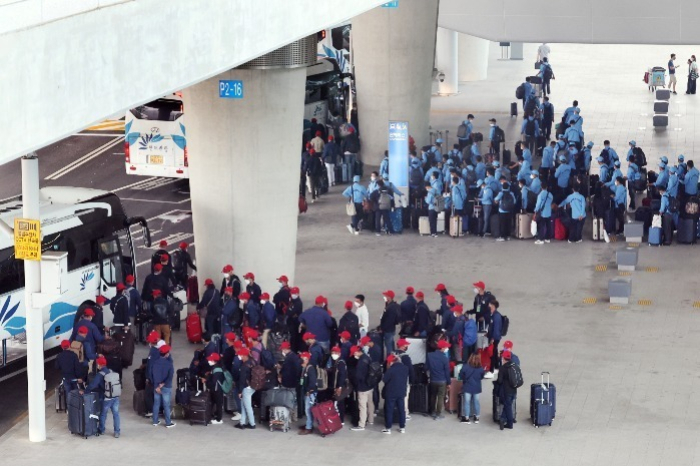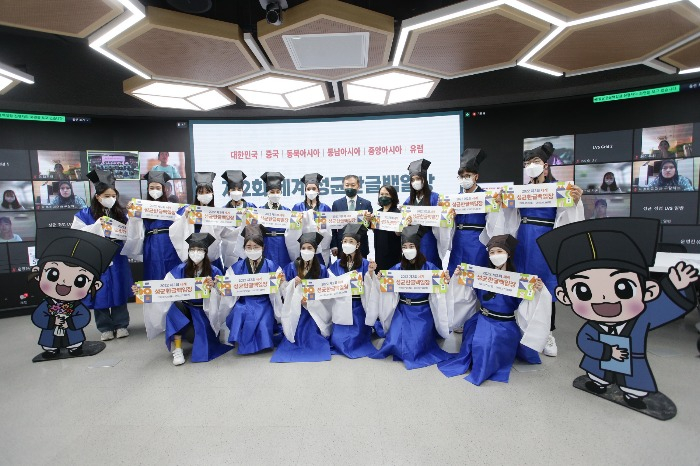Economy
Korea to retain more skilled foreign workers with visa status upgrade
With an aim to launch an immigration policy control tower in 2023, Korea plans to grant up to 5,000 foreigners visa upgrades
By Dec 16, 2022 (Gmt+09:00)
2
Min read
Most Read
LG Chem to sell water filter business to Glenwood PE for $692 million


Kyobo Life poised to buy Japan’s SBI Group-owned savings bank


KT&G eyes overseas M&A after rejecting activist fund's offer


StockX in merger talks with Naver’s online reseller Kream


Mirae Asset to be named Korea Post’s core real estate fund operator



South Korea plans to more than double the number of skilled foreign workers next year as the country is struggling with a declining workforce at its major businesses amid falling birth rates and an aging population.
Next year, up to 5, 000 migrant workers with over 5 years of work experience in Korea will be allowed to change their visa status to stay longer or obtain citizenship, a senior Ministry of Justice official said on Thursday.
The number of foreign workers eligible for such a status change was limited to 2,000 this year.
“If we judge those foreign workers are essential to our country, we’ll actively encourage them to stay in Korea longer through the change of their visa status,” Lee Jae-yoo, the ministry’s immigration service commissioner, said at an immigration policy forum organized by the ministry, the Korea Chamber of Commerce and Industry and The Korea Economic Daily.
Specifically, those with the E-9 visa, which is for non-professional workers, sailors with the E-10 visa for work at Korean shipping and fishing companies, and Korean expatriates with the H-2 visa will be eligible for converting their visa to the E-7-4 visa issued to skilled professionals.

TO NURTURE YOUNG TALENT
The government also plans to nurture young talent by increasing the number of foreign students at Korean universities and younger students at technical and agricultural high schools to train them as future human resources, the commissioner said.
Under the proposed plan, qualified foreign students while studying at Korean universities will be permitted to have work experience at Korean companies and land a job after graduation under a government-sponsored program.
If necessary, they will be granted citizenship or a long-term stay, he said.
In July, the Justice Ministry launched a localized visa permission pilot project to grant foreigners and Korean expatriates the F-2, F-4 or F-1 visa with conditions that they live and work in designated regions for up to 5 years. The ministry said 28 local governments have applied for the project.
As part of its efforts to address the worsening labor shortage, the ministry said in November the country will establish a government body as early as the first half of 2023 to comprehensively control its immigration policy.
The ministry last month launched a task force to create the government body, dubbed Korea’s immigration policy control tower.
“The number of foreign residents now stands at 2.2 million and is expected to rise to over 3 million over the next few years,” said the commissioner.
Na Kyung-won, deputy chief of the Presidential Committee on Ageing Society and Population Policy, said in a video message to the forum that “Korea entered the death-cross level last year, where the number of deaths exceeds the number of births.”
Korea is expected to become the country with the most elderly in the world with about half of its population aged 65 or older by 2070, according to a government forecast.
In 2021, the country reported its first-ever drop in population, hit by a sharp fall in birth rates.
Write to Jin-Suk Choi and Jin-Gyu Kang at iskra@hankyung.com
In-Soo Nam edited this article.
More to Read
-

-

-
 Tech, Media & TelecomS.Korea to ease internship visa rules for foreign talent
Tech, Media & TelecomS.Korea to ease internship visa rules for foreign talentAug 05, 2022 (Gmt+09:00)
3 Min read
Comment 0
LOG IN


